World Cup indoor skydiving champion at 15, Singapore's Kai Minejima-Lee is now setting his sights even higher
The young athlete clinched the Singapore 2025 Sports Boy of the Year Award in June after amassing 16 medals across international competitions in 2024.
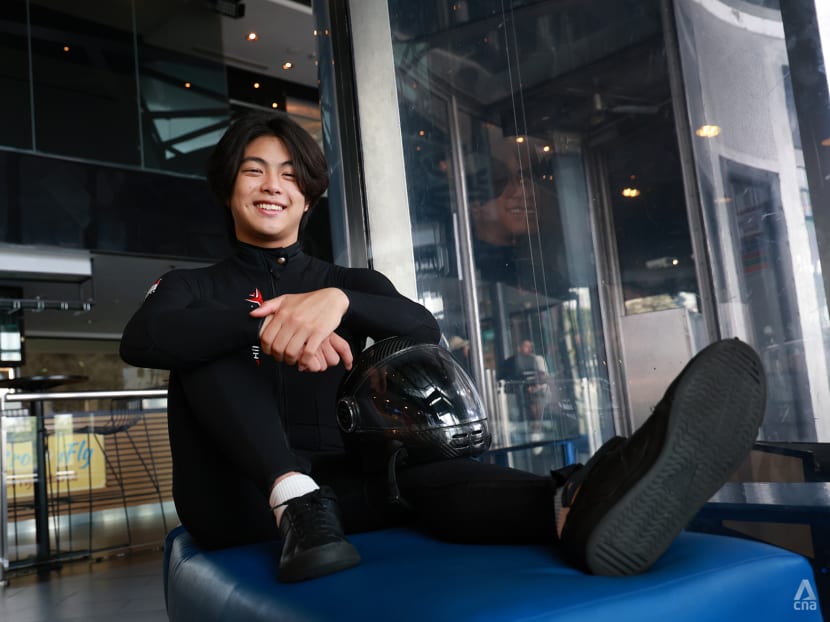
Teenager Kai Minejima-Lee (pictured) knew he wanted to be an indoor skydiver at the age of seven. (Photo: CNA/Raj Nadarajan)

This audio is generated by an AI tool.
At the mere age of 16, Singaporean indoor skydiver Kai Minejima-Lee has arguably reached the pinnacle of his sport.
Last year, spectators in Macau watching the World Cup of Indoor Skydiving witnessed the teenager outshine competitors from 11 countries to claim top spot in the solo freestyle open category.
Ninety seconds of skill and athleticism inside a vertical wind tunnel was all it took.
Kai manoeuvred his frame mid-air with ease to perform pikes, tucks and twists to the soundtrack of an orchestra, while those in attendance roared at his feats.
Call him a prodigy and few would disagree.
Kai was crowned Singapore Sports Boy of the Year 2025 in June owing to his achievements over the past year, where he amassed 16 medals – 10 gold – across various international competitions.
It was a stellar achievement, so how did he do it?
To get the answer to this question, I met the young man and his mother last month at iFly Singapore, the indoor skydiving facility on Sentosa Island and home to one of the largest indoor wind tunnels in the world.
At the interview, there was also a chance for me to fly alongside the youngest open category freestyle champ at the facility.
It became apparent a second after stepping into the vertical tunnel that flying was not nearly as easy as Kai made it look.
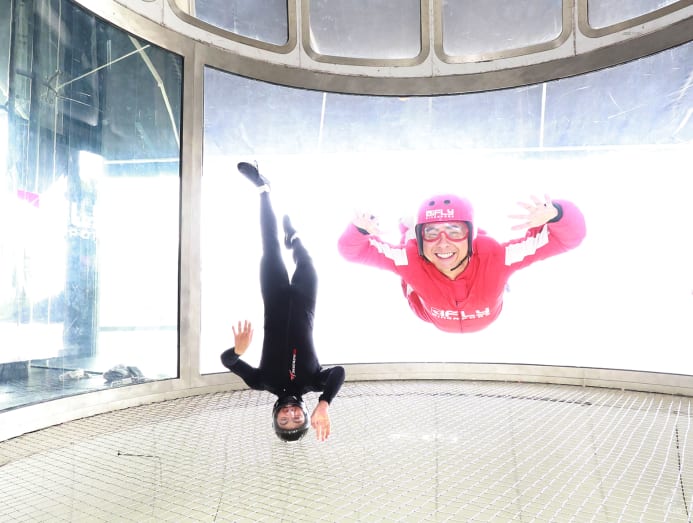
Inside, I was tasked by my colleague to pose next to Kai for a photo, but the 200kmh winds from underneath made it nearly impossible to control my facial muscles, much less keep my body in frame.
Two fans channel vertical airflow through the tunnel. Wind speeds can go up to 270kmh to give a simulation of what it feels like to jump from a plane at 12,000ft (3.65km).
As the large fans made it their mission to blow and plaster my face against the glass panels, Kai waited patiently for me to get a grip by doing somersaults front and back.
I was convinced I had made a fool of myself, but Kai's first remark to me as we stepped out of the tunnel was a hearty "You did well". I wasn't sure if I could contain my blushing face.
The indoor skydiving wunderkind was modest and unassuming, possessing none of the impudence one might associate with a gifted high-flyer.
And he was not short on confidence.
Reflecting on his history-making performance in Macau in the solo freestyle open category, he told me that he was initially supposed to compete in the junior, not open, category.
His teammate Kyra Poh got hurt and Team Singapore needed a stand-in, so he rose to the occasion. He was 15 years old then.
"It was daunting. The best competitors in the world were there. People were much older and more experienced, and there were even people who coached me when I was younger and watched me grow up," Kai recalled.
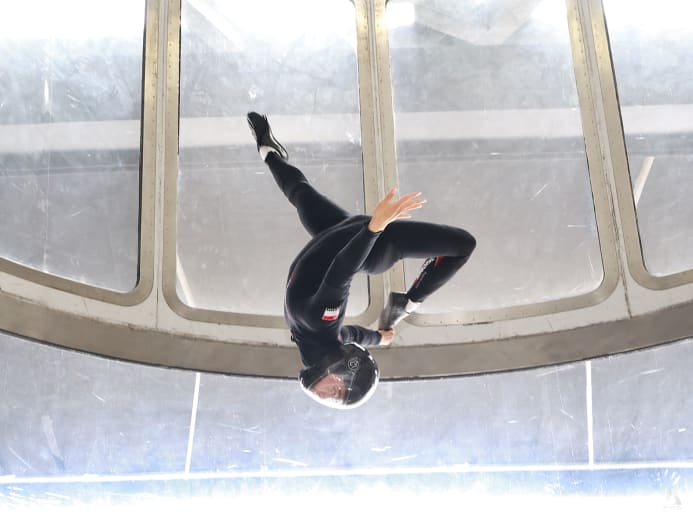
Competitors in the freestyle category often have signature "styles". There are those who perform moves with flexibility and grace, and others who choose to demonstrate raw power, Kai said.
His aim was to go "a little bit further" and incorporate both styles into his attempt and create something entirely new.
"I felt like I really managed to match everyone else … and looking back at it, it does stand out to me."
He claimed gold in the category, beating fellow athletes James Rogers from the United States in second place and Toms Ivans from Latvia in third place.
AN UNFORGETTABLE BIRTHDAY GIFT
Kai, an only child, can recall in vivid detail the first time he found himself suspended in mid-air.
He had been pestering his parents for years for a chance to skydive. On his seventh birthday, they took him to iFly Singapore.
The boy put on a blue jumpsuit in a skip, stood by the glass panels and fixed his eyes on the flyers before him as he waited for his turn in the queue. Just as his anticipation peaked, his parents mischievously told him it was time to head home.
"I almost cried," he said with a laugh.
Of course, they were only teasing him. Moments later, Kai jumped in, adopted the form of a starfish and let the colossal fans underneath do all the work.
His mother Naomi Minejima, 49, who declined to make public her profession, showed me a photo she took of him that day in the tunnel. The look on Kai's face was one of unmistakable, unbridled joy.
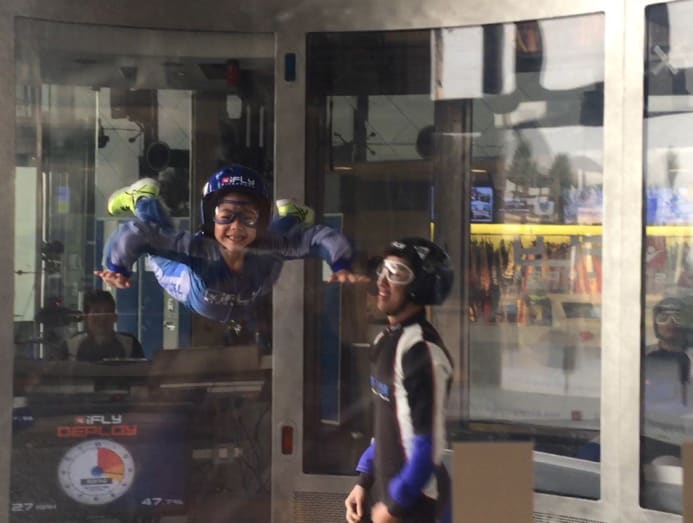
Kai said of that first experience: "The moment I jumped in, I knew this was it, this was what I wanted.
"Looking back, I couldn't even do any of the tricks I can do now, but it was still one of the best experiences I've had.
"I really couldn't care how high I was. It was just like, whoa, I'm flying! Before they could get me out of the tunnel, I was already asking to go back in."
Most people I know are afraid of heights, but Kai appears to have an affinity with the skies, for another memorable event took place when he was seven years old.
Just a few months after getting a taste of indoor skydiving, he had the opportunity to be part of the National Day Parade (NDP) 2016, not as a spectator, but as a performer riding atop a sparkling unicorn that was "flying" 30m high above the crowd at the National Stadium.
The NDP team had reached out to his parents as it was looking for a child who was both agile and not afraid of heights for the role. And Kai, who did wushu and was definitely not acrophobic, fitted the bill perfectly.
It was symbolic and foreshadowing, perhaps, considering he now has the world at his feet.
THE HOMESCHOOL OF LIFE
During competition season as an athlete, Kai trains two to three times a day. If you are wondering how he manages to balance school and a high-performance sport at 16, I had the same question.
In 2016, his teachers at the international school he attended noted that he was way ahead of his peers in terms of his knowledge of the syllabus. Kai told me that he would often be bored at school and every day, he would go home wondering why he was learning things he "already knew".
Thus, his teachers recommended homeschooling as an option and it was a decision that Ms Minejima and her husband mulled over seriously. Kai's father is 56-year-old strategic communications consultant Benjamin "Mr Miyagi" Lee.
Ms Minejima said: "Homeschooling was quite a foreign concept a decade or so ago and it didn't help when family and friends expressed concerns that it might be socially damaging to him.
"But I did a lot of research and decided it was the best option. So I stuck to it and I think it was the best decision I've made for him."
For Kai, homeschooling means a mix of self-study through online courses offered by universities such as the Massachusetts Institute of Technology or online programmes with tutors where he follows high-school or university-level coursework.
Sometimes, these tutors are based in Europe or America, so he would have to wake up around 4am or 5am for classes before heading back to sleep.
However, being homeschooled offers Kai the flexibility to compete and train all around the world, which happens four to five times a year. "I spend more time in the tunnel than I spend at home," he said.
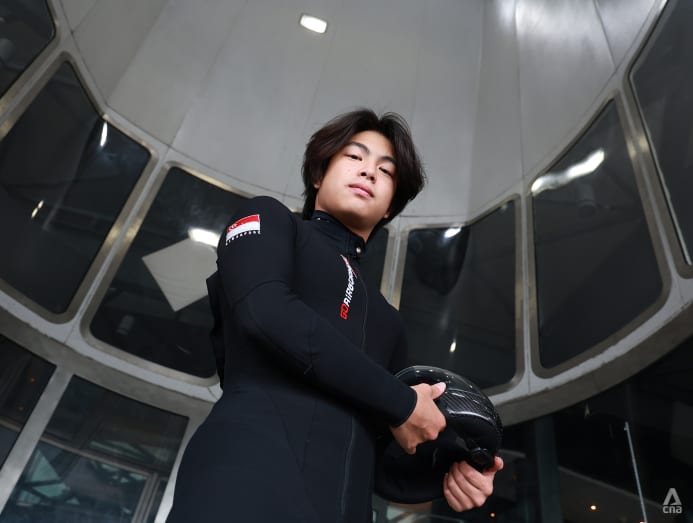
As you would expect, such a schedule leaves him with little downtime.
While his peers unwind after school, Kai is in perpetual motion, either training, studying or travelling to yet another tunnel overseas. Each tunnel feels different in size and airflow, so training abroad helps him adapt quickly to the conditions he will face in competitions.
Often, he whips out his laptop in the pockets of spare time he has between training sessions to finish school assignments.
He added candidly: "A lot of times, when people hear that I'm homeschooled, they say, 'Oh, it must be so nice, you don't have to take so many exams' ... but, like, I have less free time than you!"
When we met, he was fresh off a 14-hour flight, having been at a training camp in Italy, and though he spoke with an easy cheer, he looked bleary-eyed at times from jet lag.
"I’m a teenager and that itself is quite challenging. Juggling school and training is definitely not one of the easiest things. There's always a lot of stress and angst," he admitted.
"And sometimes, you're not sure if you want to continue or just be a normal kid."
For Kai, that might mean having more time for the things he enjoys outside the wind tunnel, including taekwondo, wushu or music. The pull of flying, though, has always outweighed the rest.
When it comes to competitions, he felt the heat most keenly in the cool climate of northern Slovakia two years ago while vying for gold in the junior category of the 2023 World Cup, where he ultimately placed second, behind his Hungarian counterpart Mate Feith.
"I lost out and I was really upset. I was considering what I should do next," he said.
It was the kind of moment that makes or breaks an athlete. For Kai, however, the loss eventually became fuel and he plunged himself back into training with the support of his family and teammates.
A year later, he would stand on the podium as champion at the 2024 World Cup of Indoor Skydiving.
ON TOP OF THE WORLD
Having reached the top of his sport before he is even old enough to drive a car, it figures that Kai has "quite a bit" on his to-do list, of goals he still wants to achieve.
At the individual level where indoor skydiving is concerned, he wants to stay at the top – or near the top, he corrected himself humbly – and to do so by innovating and experimenting with new moves.
Part of the motivation for that is to help grow the nascent sport he loves.
Indoor skydiving became a commercial and recreational sport in the 1980s, after Canadian inventor and former army parachutist Jean St-Germain invented the "Aerodium", a wind tunnel to allow people to practise freefall safely.
It first opened for public flight in Quebec in 1979, which laid the foundation for the modern indoor skydiving industry.
Today, there are more than 200 wind tunnels in cities around the world, but indoor skydiving is not included as a sport in the Olympics.
Kai said: "In Macau, where the World Cup was, there was the inaugural Asian championships.
"And we saw many more teams coming up from Asia and Southeast Asia – from China, Indonesia, Malaysia, South Korea and Thailand.
"One of the goals I have is to compete in the Southeast Asian Games if we can manage to push the sport that far, so that's what my team and I are doing. We're trying to grow the sport both in Singapore and overseas.
"It'll be really cool to be able to foster a new generation and to push the sport to bigger stages. And of course, the ultimate dream for me is to be able to compete at the Olympics."
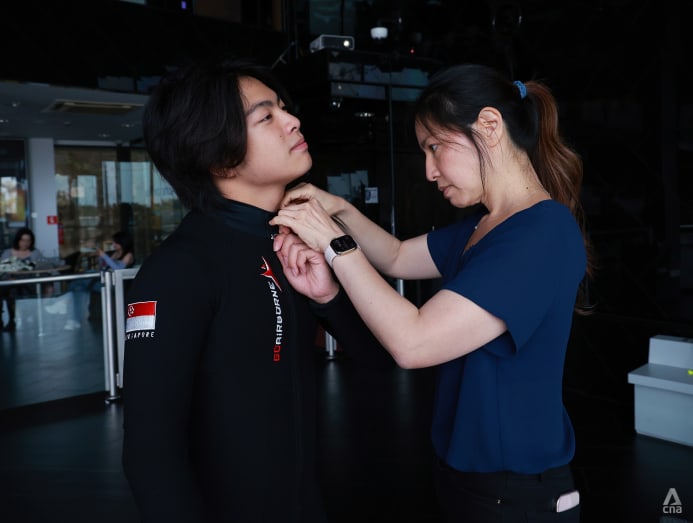
One thing immediately obvious from our conversations was that Kai was always quick to acknowledge that his accolades would not be possible without those who gave him the wings to do so in the first place.
Grounding him through all the trials and tribulations of his young life is his family, especially his mother.
I had asked about who he looks up to most in life and it didn't take long for him to point to the woman sitting next to him.
"When things get tough for me, especially when I'm trying to juggle school and training, I think to myself, if she can play so many roles, then I should be able to do it, too."
That is why, even with his hectic schedule, he is taking on a role as coach this month to guide two students and prepare them for competition.
The coaching role came about organically, in line with Team Singapore's ethos of giving back to the sport.
Kai is now training a 13-year-old skydiver representing Thailand – who was his partner in the Dynamic 2-Way category in the Australian Open in August – for the Polish Open and the Windobona Open in Madrid, Spain later this year.
After a family member of a 17-year-old skydiver representing Japan found out Kai was going to be at the Australian Open as well, they reached out to ask if he was interested in coaching her, and Kai felt ready for the challenge.
"(Being an athlete has) taught me so much about life in general, sportsmanship and how to hold myself together in tough moments," he said of why he wanted to do this and give back to the community.
Looking even further, with his whole life ahead of him, it should come as no surprise that his goals are not confined to the wind tunnel.
A self-professed physics and mathematics geek, Kai is fascinated by space.
I tried to clarify if I heard right.
"Yeah, since I was young, I've always been really interested in space and I've wanted to be an astronaut.
"I've always had a strong interest in maths and physics so that's what I'm focusing on for my studies now. And when I go to university, it will definitely be something related to that."
Before we wrapped up, I asked him how he would introduce himself to someone if he couldn't use the word "skydiving".
He paused for a long while before stating: "I'm Kai, I'm 16. I spend most of my life flying."
Like a superhero? He laughed and replied: "You could say that."










